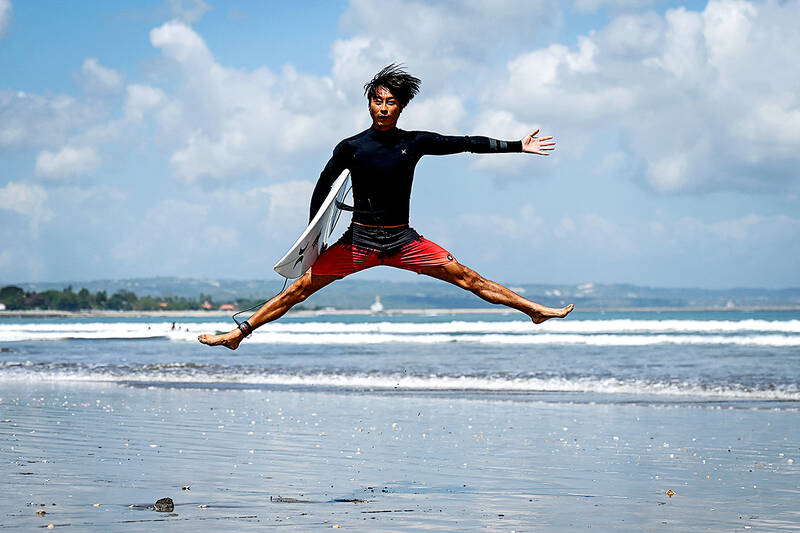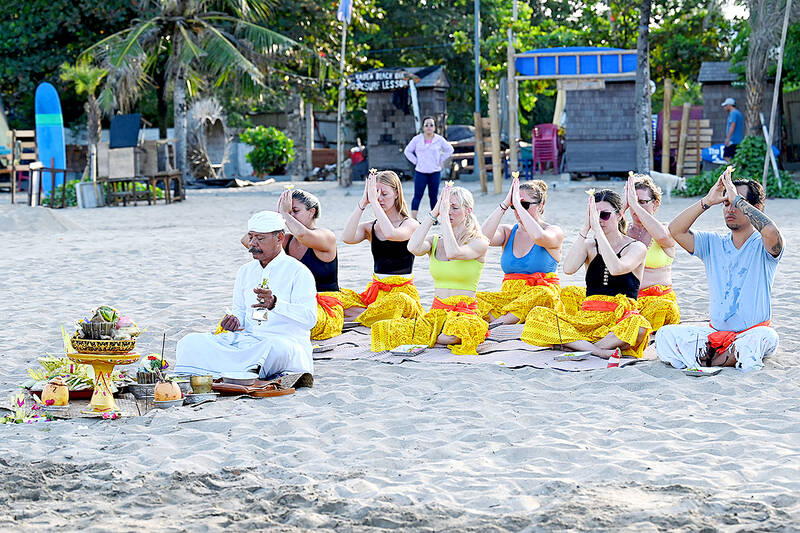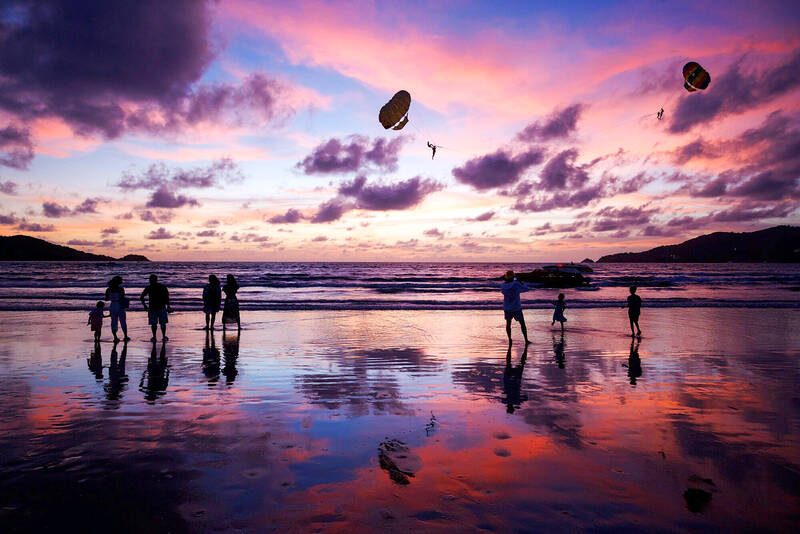The trend toward longer work-leisure trips has accelerated as demand for international travel has grown after years of restrictions.
Therese-Heather Belen is living the dream, working full-time remotely while traveling across Vietnam, Thailand, Japan and India.
But the dream comes with a catch: her workday starts in the evening and lasts well into the night. He works and has early morning meetings, roughly 12 hours apart, to be in the same time zone as his colleagues at his New York-based marketing technology firm.
For some, ambitious „work” trips like these are seen as a way to make up for lost time during pandemic lockdowns. For others who choose to wander far from their home time zone, such adventures are sure to turn out to be hellish journeys into the land of alienation and insomnia.

Photo: AFP
Belen said traveling with Remote Year can serve as a program like traveling abroad for working adults, a lifestyle that allows them to experience more of the world than a traditional 9-to-5 job. „You always hear stories like, 'I went skydiving before I started my job,'” he said.
Remote workers and so-called digital nomads have been logging odd hours in hotspots like Bali and Goa long before Covid-19. But the sudden shift to remote work during the pandemic has drawn many people’s long-idled imaginations into the realm of possibility. Nearly 17 million U.S. employees describe themselves as digital nomads, more than double the number before the pandemic, according to MBO Partners, which connects companies with freelance talent.
The trend toward longer work-leisure trips has been accelerated by growing demand for international travel after years of restrictions. This has given some digital nomads a bad reputation for jacking up prices and trampling on local culture in popular vacation spots, but that hasn’t slowed them down. Dozens of countries are marketing new types of visas to these professionals to compete for tourism dollars. Despite several highly publicized back-to-office announcements in recent months, some degree of remote work remains a feature of most companies.

Photo: AFP
Many remote workers who have moved to remote locations, like Belen, work a split shift, logging in for a few hours from late evening to midnight, taking a few hours to sleep, then waking up to log on to another location. Round.
And it works to a certain extent. Her mother was a labor and delivery night shift nurse, so the idea of sleeping during the day didn’t strike her as foreign. He is usually online with colleagues until 1am or 2am and then sleeps until 10am. But because her job revolves around meetings, she’s sometimes on call all the time. „I have a meeting tonight from 3:30 to 4 o’clock that I have to be at,” he said. „So I have many, many alarms that are set for very random hours, and I jump into that meeting and then go back to sleep.”
Some people, like Belen’s partner, a software engineer, have an easier time with time zone differences. That’s because their jobs have fewer appointments and are open to asynchronous work, so they have more flexibility to work things out on their own schedules.

Photo: Bloomberg
Tue Le, CEO of Remote Year, estimates that 15 percent of program participants traveling in Asia observe strict American time by staying up overnight. The third working hours are flexible with a mix of evening or early morning hours to collaborate with colleagues at home.
Ilene Rosen, a professor of sleep medicine at the Hospital of the University of Pennsylvania, said that people with post-transplantation wires can stay awake at night. But for many others such schedules go against ingrained circadian rhythms, making it challenging or impossible to get enough sleep. As anyone who has had to get up early to go to work after a terrible night’s sleep can attest, it can sap energy, undermine concentration and emotional control. Bottom line: Constantly pulling all-nighters is generally not a good idea for optimal health, let alone optimal work performance.
„The science that we’ve come to understand over the last 20 years, while it’s exciting, it may be possible to do it even for a short period of time, and it’s not the best for our bodies,” Rosen said. Studies have long found night-shift work to be associated with serious health outcomes, such as heart disease and cancer.
Still, some travelers are determined. Jessica Hilbrich, who works remotely at an Indianapolis-based data and IT consulting firm, committed to working eight hours of sleepless nights when she traveled to Southeast Asia last spring. That means logging in at 8pm and signing in around 4am. When Hilbrich started his work in the evening, there were often others in the co-working space, but the place was usually empty by midnight. Whether she works completely remotely from her home outside of Chicago or from a co-working space across the globe – it’s important to her that her performance is immobile.
One strategy Hilbrich developed is to pre-load cognitively demanding tasks, such as deep thinking and writing, the night before when she’s sharp. After her work day is over, she sleeps for a while and takes as many naps as needed.
„Don’t let people shame you,” he said.
For Hilbrich, this kind of travel comes with a different mindset. It’s not a „vacation,” it’s about relaxation above all else for her. It’s about making a real connection with a place and the people who live there. „I can’t quit working, and before I retire, I can enjoy more places while I’m young.”
Even with such best practices, night work can be punishing—and not for everyone. After two months, Belen’s sleep schedule was completely abandoned.
„I would say I struggle – everyone I know struggles to some degree.”
Some of the people she met during the trip had to quit their jobs. Others had to cut their time short. Someone she knew was fired. Often, the inescapable truth is that some people are simply short-changed — whether they like it or not.
While some digital nomads make it work, others who can’t hack it throw in the towel and go home.
„I’ve met a lot of people who say they’ll never do it, never try,” said Carolina Zuniga, who works remotely in marketing and is returning to Bali for the third time from her home in Costa Rica. . She has met others who start out very enthusiastic but quickly run into problems. Their trip turns out to be a bust, and they are too tired to go out and see or do anything.
Jordan Carroll, a career coach, calls it „hell of change.” Years ago he used it when traveling through Thailand and Indonesia, leaving for a midnight ride to the motorcycle OA 24-hour co-working space. Some nights he tried to split the shift in two. Other nights he tried to direct power. Neither worked. „For me, it was very scary,” he said. „Your internal clock gets really messed up. I couldn’t really function. Even when I went out with friends I was tired. I couldn’t really be myself.”
All these concerns are on Zunika’s mind. He’s now 30, and said the lack of sleep takes a bigger toll now than when he was traveling in his early 20s. „I’m very worried at the moment, but I’m interested to see how it goes,” he said.
For those determined to give it another shot, the University of Pennsylvania’s Rosen advises staying as consistent as possible, even on weekends. Keep your room as dark as possible when you sleep during the day. He offers the same advice to incoming medical residents preparing for their first overnight shifts. This includes avoiding the pre-dawn light at all costs – wear dark sunglasses, even if it’s cloudy. Melatonin is useful for regulating sleep, but timing can be tricky when daily sleep schedules vary.
Belen can relate. She knows all the tips and tricks. Even so, she came down with a bad cold before a long-planned motorcycle trip. After a week of worrying about whether it would prevent her from traveling, her home remedies kicked in and she was able to recover enough to walk. It was hard, but it was worth it, she said.
„I would do it again in a heartbeat.”
Comments will be reviewed. Keep comments relevant to the article. Comments containing abuse and obscenity, personal attacks or promotion will be removed and the user banned. The final decision will be at the discretion of The Taipei Times.

. „Gracz. Namiętny pionier w mediach społecznościowych. Wielokrotnie nagradzany miłośnik muzyki. Rozrabiacz”.
